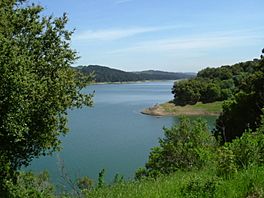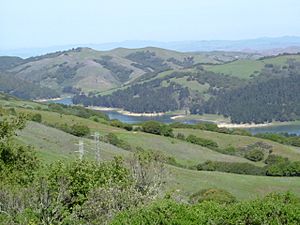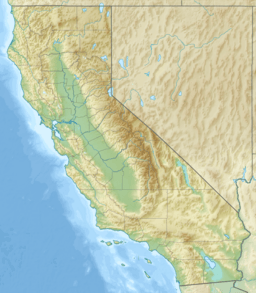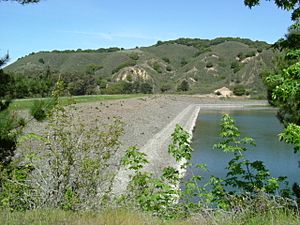San Pablo Reservoir facts for kids
Quick facts for kids San Pablo Reservoir |
|
|---|---|
 |
|
| Location | Contra Costa County, California, United States |
| Coordinates | 37°56′36″N 122°15′42″W / 37.94333°N 122.26167°W |
| Type | Reservoir |
| Primary inflows | San Pablo Creek |
| Primary outflows | San Pablo Creek |
| Catchment area | 23.37 sq mi (60.5 km2) |
| Basin countries | United States |
| Surface elevation | 305 ft (93 m) |
The San Pablo Reservoir is a large lake in California. It holds drinking water for many people. The East Bay Municipal Utility District (EBMUD) owns and manages it.
You can find this reservoir in the valley of San Pablo Creek. It is north of Orinda, California and south of El Sobrante and Richmond. It sits east of the Berkeley Hills, between San Pablo Ridge and Sobrante Ridge.
Contents
San Pablo Dam: Building a Water Supply
The San Pablo Dam is an earthen dam built in 1919. It is located at one end of the reservoir, near El Sobrante. The dam helps create the reservoir by holding back water.
The reservoir can hold a lot of water, about 38,600 acre-feet (47,600,000 m3). Its watershed, the area of land where rain collects and flows into the reservoir, is about 23.37 square miles (60.5 square kilometres). A special water tunnel runs under the hills from the reservoir to a pumping plant in Kensington. This helps move the water.
Most of the water in San Pablo Reservoir comes from far away. It travels over 100 miles through the Mokelumne Aqueduct. This aqueduct brings water from Pardee Reservoir in the Sierra Nevada mountains.
Fun at San Pablo Reservoir Recreation Area
EBMUD also manages the San Pablo Reservoir Recreation Area. This area lets people enjoy the reservoir and the land around it. There is a small fee, about $7, to enter the park each day.
The recreation area has a restaurant called the San Pablo Grill. There is also a gift shop where you can buy fishing permits and rent boats. You can find picnic areas and a play area for kids. There is also a boat launch ramp to get boats into the water.
Because this reservoir holds drinking water, you cannot swim or wade in it. However, fishing, boating, and canoeing are allowed. To keep the water clean, only boats with special four-cycle engines that use MTBE-free gasoline are permitted.

There is a 5+1⁄2 miles (8.9 km) trail along the west side of the reservoir. This trail is great for hiking and biking. It follows an old road that was replaced in the 1950s. You cannot walk all the way around the reservoir on trails. Some trails on the east side are closed to the public, even if you have a special permit. The road on top of the dam is also restricted.
Many people enjoy fishing here. They catch fish like smallmouth bass, white sturgeon, bluegill, and crappie. The reservoir also regularly adds trout and catfish for anglers. The California Office of Environmental Health Hazard Assessment (OEHHA) has advice for safely eating fish from the San Pablo Reservoir. This advice is based on levels of mercury or PCBs found in the fish.
San Pablo Reservoir was once considered as a possible place for rowing and canoe races. This would have happened if San Francisco had hosted the 2024 Summer Olympics. The reservoir has hosted rowing events before. Since 2015, the Oakland Strokes have held the USRowing Southwest Masters Regional Championships here.
Making the Dam Stronger: Seismic Retrofit
In 2004, a study found that a big earthquake on the Hayward Fault could cause the San Pablo Dam to sink. It could settle as much as 35 feet (11 m). To be safe, EBMUD lowered the reservoir's water level by 20 feet (6.1 m). This created a 35-foot (11 m) safety space.
The dam was made stronger to withstand earthquakes. This process is called a seismic retrofit. Workers mixed concrete into the soil at the bottom of the dam. They also added a new support layer on the downstream side. This construction started in August 2008 and finished in September 2010. The dam stayed in use during this time.
Images for kids
 | Delilah Pierce |
 | Gordon Parks |
 | Augusta Savage |
 | Charles Ethan Porter |





